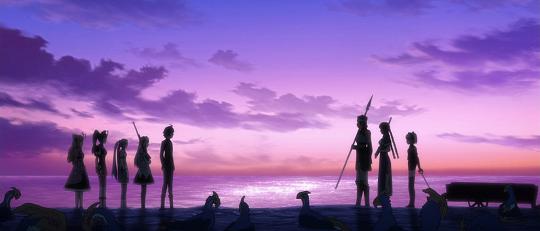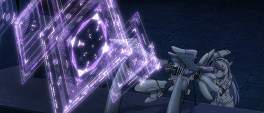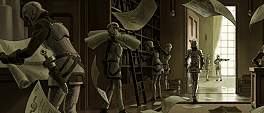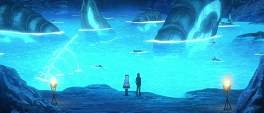The second season of Hitsugi no Chaika (Chaika the Coffin Princess), subtitled Avenging Battle, may become a bullet point in the argument against the practice of a splitting a broadcast in two. The first season didn’t exactly shake the earth but was supremely enjoyable and didn’t have any disagreeable sharp edges to it. The second season continues Chaika’s story of collecting the remains of her father, the infamous Emperor Gaz, along with her saboteur companions Toru and Akari.
For a while at least it seems to be business as usual: locate hero, procure gruesomely severed body parts, find out more about Gaz and the history behind Chaika. Then suspicion creeps in that this story train is heading full speed for a finale, and it’s not stopping at any stations.
Twenty two episodes for a series is nothing to turn your nose up at (see also Hyouka, Ghost Hound, Texhnolyze and Psycho Pass); splitting the broadcast however means that this second season is only ten episodes long. It’s a number that raises suspicions of creative differences, of time constraints, of budgetary concerns. The ending then is not rushed - it ends in exactly place you would expect given all that’s gone before - the story as a whole though hasn’t had time to breathe. Careening from one situation to another (Doomsday Weapon! Black Chaika! Toru and Akari’s mentor! Emperor Gaz!) its principal players aren’t afforded the time to gather their thoughts meaning we, the audience, aren’t given time to gather theirs.
White Chaika for instance has her world ripped out from beneath her, tears and confusion abound, yet she meets up with Niva whose own story is primed to be a reflection of her own. Nope, no time, we’ve got castles to storm and battles to wage. Toru, similarly, was pitched as a conflicted ex-soldier, yearning for purpose in a world bereft of war. His relationship with Chaika is obviously romantically tinged yet when his resolve is tested, his decision seems flippant rather than measured. All the pieces are there: his ex-mentor claiming he was never cut out to be a saboteur, the change from desiring battle to wanting to protect, even the significance of becoming a knight. But it all gets compressed and distorted without the foundation of introspection, meaning many events boil down to: because plot.
It’s a shame because the thematic skeleton of the story has always been about what people do when their raison d'etre is removed. The heroes who originally slayed Gaz turn to madness, to paranoia, to winemaking; the Chaikas who continue their mission even when their grim purpose is revealed; the saboteurs who take any mission if it involves battle. To not reflect on these concepts when the story has more or less gifted them a giant mirror is endlessly disappointing.
Moment to moment this season retains the same chemistry of the core quartet: Chaika, Akari, Toru and Frederica. Toru and Akari still trade barbs despite the latter’s deadpan incestuous adoration of the former, Chaika and Toru orbit one another with furtive looks and blushing cheeks, Frederica meanwhile lusts for bloodshed and her whimsical, cavalier demeanour only makes her lack of achieving it all the more amusing. Other groups don’t fare nearly as well. Red Chaika, who shares the same disjointed speech pattern as White Chaika only with more fury behind it, rarely proves to be anything more than a pleasant aside for all the effect her and her otherwise wonderful snake-blade have on the story.
The Gillette squad too have little to say for themselves after the eventful end of season one. Now that they are no longer hunting the White Chaika’s group the pressure is off and they are relegated to relaying the political situation (such as it is) despite having another Chaika and a demi-human in their group, and a whole island of story hooks to latch on to. I stated in my review of the first season that it was Gillette who provided context for the world that Gaz left behind and while you could argue the same is true here, it proves not to be a world worth exploring.
Certainly the opening scene of the first episode provides more about Emperor Gaz and his empire than the entirety of the first season: we see his castle in all its Soviet-bloc grandeur and even catch a glimpse of the man himself, wispy beard and all. For the first few episodes at least then, the structure of the first series makes a return: advance to new location, have adventures, receive information, repeat. By wrapping up the story though the characters congregate in a single location that happens to be a dirty, drab looking castle of dark corridors and characterless arenas. Even the beautifully detailed neon magic of the gundos can’t cover up a rote and boring set of environments, far and away from the floating castle, walls literally lined with the dead, that was the climax of the last season.
This second season then is a cavalcade of missed opportunities, the story train continually missing the signals to slow down and the chances to change track. Each character, that was so expertly crafted in the first season with deliberate pacing and judicious screentime, is either left by the wayside or has an emotional arc that is never satisfactorily concluded. Grander themes are abandoned even as incidental themes like the body horror of the Chaikas, reinforced by the rebirth in the penultimate episode, or the effect of parents on their children demonstrated by the Black Chaika’s last words, are ignored in service of getting to the end of the story without ever really finishing it.
That end leaves a bitter taste not only for its lack of emotional conclusion (though that’s a large part of it) but because by condensing all of the revelations into barely half an hour, it’s difficult not to see Chaika the series as ultimately silly. That is its lasting legacy then: not as a story of a little girl, lost in a forest finding a family, finding a goal beyond the wants of her father but as a pants-on-head stupid romp through a world of unicorns and dragons and wizards. To be able to undo all of that good will earned in the first season in such a short a space of time is impressive, but not necessarily something to be proud of. An otherwise fine series with humour and drama alike but spoiled by an ending that is indicative more of poor planning or skittish purse-strings than lack of will or imagination.









Well, if you take the padding out of the box, you're intricate glass vase will arrive as a heap of shards. You can guess at it's original beauty, but that's it.
Stripping down a story to its plot points might work for a show whose main draw is suspense. It doesn't work for a show like Chaika which relies a lot on themes:
1. Purpose.
Chaika is the name for a purpose. There are many ways to fulfill that purpose. Making Chaika multiple persons ensures adaptability. You don't know who will succeed, or how. But it also means that purpose isn't absolute, because as people's circumstances change, so do their priorities.
So, with different Chaikas we get different perspectives on the same purpose. The same memories, the same task, but different approaches. This works well enough in the first season. But as the plot train speeds up and the scenery rushes by, all you can see is a progression of Chaika. Instead of taking in the theme, instead of empathising with the girls who live this, I find myself imagining a super sentai show: Chaika rangers, where all the villains are Chaika. It's Chaika all the way down. The Chaika homunculi near the end, rather than a horrifiying distillation of the theme, end up the puch line of a serial joke.
2. Warriors want war.
One of the key moments in the ending is when Chaika asks Toru whether he shares Hartgen's desire for war, and Toru is shocked by a personal epiphany. The scene arrives with a whimper and goes nowhere. But it's integral, because of the perspective shift: as a saboteur, you want a job, but as a ruler you have responsibilities for the people you rule. It's simple and elegant: all Toru wants is a job; the implications of his job don't sink in until he sees them played on a national scale. Here's someone positioned to influence the live of just about everyone - and suddenly you see the implications of what you've always wanted clearly in all its horror. And that revelation is based on a new feeling that's been growing in Toru: he wants to protect Chaika. So that Chaika asks the question is significant.
But because of the speed of the plot, the repitition seems like, rather than thematic poignancy, a restricted imagination. When Gaz then thinks that all people ever want is war, you can't help but think, well, yes. In this fictional universe... The resolution, even though a plot-necessity, feels contrived.
3. Magic.
Hand in hand with the warriors-want-war theme that runs through the show is the nature of magic. Magic, here, is not the creative force of a civilised creator. It's the primal instinct of the huner. The source of magic isn't gods; it's magical predators - the faila. It's no coincidence then, that magic tools conventionally come in the shape of guns. You sight your target and pull the trigger. To work magic, you need to sight a target.
Apart from Chaika's gundo, the character who embodies this is Frederica, an nigh mpossible-to-kill killing machine, who adapted to new circumstances by play-fighting. I was joking that her true form is actually the cat; she behaves so much like a kitten that doesn't need to hunt to survive. I've always had the impression that Frederica knows things she's not sharing. Our team got the information that no doubt Frederica could have given them from a dying Kraken. I also strongly suspect that there's a story about "Frederica". The dragoon isn't an imaginative creatur: her other shape was that of the dragoon knight. She seems to only want to fight. There's no sense of creativity at all. So where does "Frederica" come from?
I suspect that the anime has ruthlessly cut around her, leaving only the serial deaths. On a forum, someone made a South Park joke: "Oh my god, they killed Frederica." I laughed. That's quite literally what remains of her role.
To summarise, I'd say that the second of season of Chaika is the single-mindedly plot-focussed adaption of a theme-based story. This is really a guess, because I do not know the novels (though I recognise a lot of elements in the adaption of Chaika from the adaption of Scrapped Princess, by the same author). But if I'm right, my key problem is this: the themes are still there, accessible to the intellect. But they're not intellectually challenging. Their power comes from emotional involvement with the idea of finding your place. It's nothing you haven't seen before, and you'll see it again. But if you're susceptible to that sort of story, it's comforting. This adaption, by rushing it, highlights the fictinality of what's supposed to comforting.
This is my wordy way of agreeing with you. Squandered. I was lucky, though. I didn't end up with any bitter taste in my mouth. I got away with a weary, "Oh well." Sometimes things just don't work out.